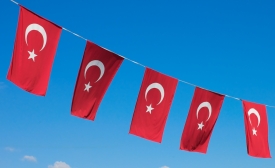recep tayyip erdogan
“Why tweet in English?” demanded a pro-government commentator of his opponent in a TV debate, insisting that Turkish people tweeting in English about the recent graft probe is part of an international conspiracy. Twitter has become the most recent fixation of Turkey’s ruling party who alleges the social media platform is a part of the international conspiracy against the Justice and Development Party, Ihsan Dagi discussed in a piece originally published by Turkey’s Today’s Zaman.
Two years ago, I argued in a Washington Post opinion piece that Turkey was pivoting toward the United States ["A blossoming friendship; Obama, Erdogan are restoring their countries' bond," Nov. 13, 2011]. This policy has not ushered in what Ankara wanted: American firepower to oust the Assad regime in Syria. And feeling alone, Turkey has started to seek other allies, including Beijing. When the Justice and Development Party (AKP) came to power in 2002, Prime Minister Recep Tayyip Erdogan and other Turkish officials toyed with the idea of being a stand-alone actor in the Middle East.
There has been constant "dark propaganda" on media outlets and social media networks about the Turkish police’s attitude during the ongoing Gezi Park protests, Prime Minister Recep Tayyip Erdoğan said, addressing members of security forces in Ankara July 24.
Ishaan Tharoor wrote in the Time magazine: “Two years later [today], Turkey’s vaunted soft power looks more soft than powerful… Erdoğan, too, cuts a smaller, humbler figure on the world stage… His overwhelming support for the Syrian opposition is not mirrored by the majority of the Turkish public, and his reliance on other foreign powers to push the diplomatic envelope has resulted in something of a loss of face.”
The recent developments the world has been witnessing leave no room for doubt that Turkey is an exceptional and indispensable player on the regional and global stage. Turkey, with its vital geopolitical position, cultural and historical wealth, economic potential, secular democracy and political influence and efficiency, is among a few countries that can play such a critical role. In this global arena, one of the most important keys to Turkey’s success has been the country’s new foreign policy and public diplomacy strategies.

Sherine B. Walton, Editor-in-Chief
Naomi Leight, Managing Editor
Tracy Bloom, Associate Editor
Sarah Myers, Associate Editor
Turkey’s mercurial leader is clearly a man on the move – and he is taking his country along for the ride. A decade ago a somewhat cautious American ally and Nato member, Turkey today is becoming a force to contend with, particularly in the Middle East, a region it had kept at an arm’s length for decades.







